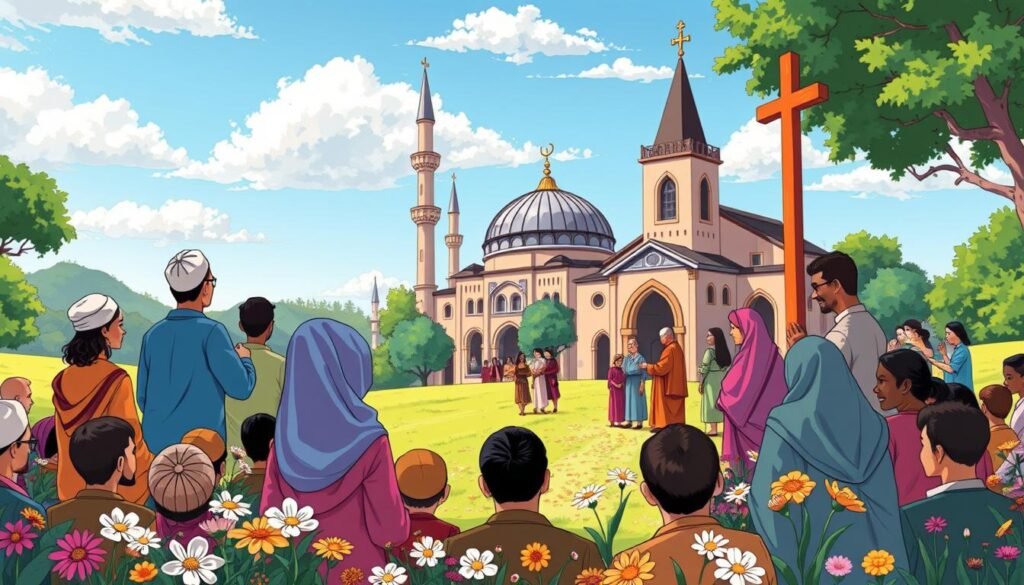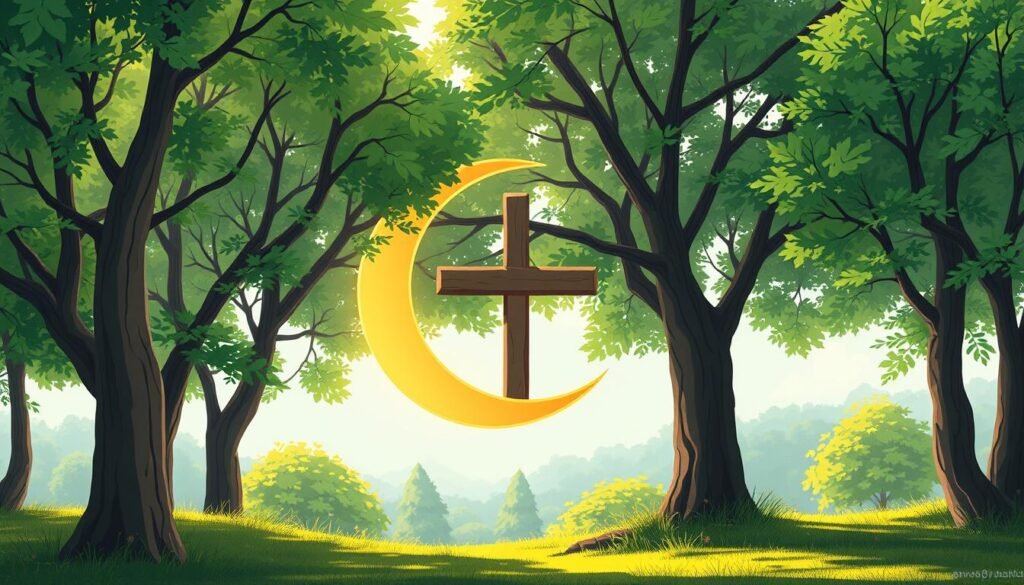Can you be both Muslim and Christian in a world where faiths often clash? About three and a half billion people are Muslim or Christian. This question makes us think about faith in a new way.
Miroslav Volf, a famous scholar, says Muslims and Christians might worship the same God. This idea makes us wonder about the meaning of faith and how we see it.
We look at if people can be both Muslim and Christian. This journey into Muslim and Christian identity shows us what they share and what they don’t. It’s a deep conversation that helps us understand each other better in our global world.
The Intersection of Islam and Christianity
The similarities between Islam and Christianity are deep and interesting. Both faiths believe in the virgin birth of Jesus. The Bible and the Qur’an tell how Gabriel told Mary about this miracle.
Both traditions honor Mary a lot. The Qur’an has a whole chapter about her (Sura 3, Ayah 42).
But, there are also big differences. Muslims see Jesus as a great prophet, but Muhammad is the final prophet. The Qur’an says Jesus is not God’s son, like Adam.
Muslims don’t believe Jesus was crucified. They think he was taken to Heaven without harm (Qur’an 4:154-158). These views are key in talks between the two faiths.
Both Islam and Christianity preach love and following God. Pope Francis has called for understanding and respect for Islam. He wants to stop violence and spread love.
More people from these faiths are meeting and becoming friends. They share stories of respect and kindness. This shows that shared beliefs can bring people together.
Understanding the Common God
The idea of God being common in Islam and Christianity is key for understanding each other better. Both faiths deeply respect God, but see Him in different ways. Scholars have talked a lot about if Muslims and Christians really pray to the same God. They found that Christians have many views on this.
Many Christians are now more curious about Islam than ever before. This curiosity helps start conversations and seek mutual respect. As more Muslims join American society, interactions between Christians and Muslims are growing. It’s hopeful that both faiths value prayer and devotion, even if they see God differently.
The talk about God’s nature is getting richer, thanks to the Catholic Church. They agree with Pope Saint John Paul II and Pope Francis that we all worship one God. But, the idea of God’s mercy is a big topic of debate. Islamic texts say God’s mercy is key, leading to different views on what it means.
Historical Context of Islam and Christianity
The rise of Islam and Christianity is a captivating story. It shows the history of Islam and the history of Christianity. Both faiths come from the Abrahamic tradition, with Abraham, Moses, and Mary being key figures.
They both respect Jesus a lot. In Islam, Jesus is seen as a miracle worker. The Quran has a whole chapter on Mary, showing his importance.
For a long time, both faiths saw Christians and Jews as “People of the Book.” This means they recognized their shared heritage and scriptures. Prophet Muhammad even sent a letter to monks at St. Catherine’s Monastery, protecting their right to worship.
This shows a complex but respectful relationship between the two faiths. It’s worth looking into more.
The religious intersect between Islam and Christianity is also seen in poetry. Poets like Hafez have written about Jesus with respect. Even America’s Founding Fathers, like John Adams and Benjamin Franklin, admired Muhammad.
They saw value in Islam’s teachings, despite political issues. This shows the possibility of working together on common goals.
Events like the Crusades and the Reformation have deeply affected both religions. Knowing about these events helps us understand today’s Muslim-Christian relations. Their shared history shows that political conflicts can’t erase their common beliefs.
Can You Be Muslim And Christian?
Can one have two religions? It’s a deep question. Many people explore both Christianity and Islam. Rev. Ann Holmes Redding is a great example.
She was a priest for over 20 years. Then, she became Muslim about 15 months ago. Her story shows how love and unity can bring together two faiths.
Exploring Interfaith Identity
Rev. Redding’s journey is filled with ups and downs. She was in the Episcopal Church. But, she found a new faith.
She has a Ph.D. in New Testament. This helped her understand her spirituality better. She prays five times a day with an African-American Sunni group.
Case Studies of Interfaith Practitioners
Stories like Rev. Redding’s show the connection between Christianity and Islam. Both faiths are Abrahamic and have deep histories. But, they disagree on important points.
Rev. Redding’s faith journey shows how faith can change. It inspires those looking for spiritual growth in a complex world.
Key Differences Between Islam and Christianity
The differences between Islam and Christianity show the core beliefs of these two big religions. Knowing these differences is key for those interested in talking between faiths. A big difference is how they see Jesus.
The Nature of Jesus in Both Faiths
In Christianity, Jesus is seen as the divine Son of God and the savior. His divine nature is key to the idea of salvation. Christians say believing in Jesus is needed for eternal life.
In Islam, Jesus is seen as a prophet and messenger. He is respected for delivering God’s message. But, Muslims don’t see him as divine. They believe Jesus was taken to heaven and didn’t die on the cross. This changes how they see his role in salvation.
This disagreement shows a big difference between Islam and Christianity. It makes us think more about their beliefs.
Beliefs About God and the Trinity
How people see God is another big difference. Christianity believes in the Trinity: one God in three persons. This idea is central to Christian beliefs, showing the complexity of the divine.
Muslims, on the other hand, believe in one God, called Allah. They don’t accept the Trinity, seeing God as singular and indivisible. They also see sin differently, blaming human weakness and forgetfulness, not original sin.
This shows another difference between Islam and Christianity. It points out how they see sin and accountability.
Personal Stories of Dual Faith
Embracing both Islam and Christianity can be complex. People with dual identities share inspiring stories. These stories show the joy and challenges of their spiritual journeys.
Some people tell of celebrating holidays that mix both faiths. They create special family traditions. These stories highlight the beauty of coming together, even when we’re different.
Documentaries like “All of Us” show families working for harmony. They film in five countries, showing how people can live together peacefully. In places where secularism is common, Muslim-Christian families show love can overcome differences.
People start deep faith discussions through emails. This leads to understanding and meaningful connections. Their stories are not just about personal faith but also about building a better future together.

The Role of Community in Mixed Faiths
Community support is key for interfaith families. It helps them feel understood and accepted. Neighborhoods and families play a big role in this.
When groups welcome interfaith families, it makes everyone’s life better. Studies show that being part of blended faith communities helps people connect more. It also leads to more talks and teamwork.
Reactions to interfaith families vary. Some Muslim and Christian groups are very welcoming. Others might find it hard to accept.
This shows how society views interfaith relationships. It highlights the need for places where everyone can be themselves without fear.
Inclusive communities are important. They help grow compassion, understanding, and respect. This helps interfaith families and brings people together.
Community leaders need to work hard to make these spaces. By doing so, they help build bridges. This lets people from different backgrounds share their beliefs and stories. It makes the community stronger for interfaith families.
Religious Leaders’ Perspectives
Religious leaders’ views are key in understanding interfaith acceptance. They help us see how people with dual religious identities are viewed. Some Muslim leaders say it’s okay to follow both Islam and Christianity. They believe Islam sees Jesus as a prophet.
This view opens doors for people wanting to explore different faiths. It shows a way for those in complex spiritual situations.
Support from Muslim Leaders
Many Muslim groups, like Al Azhar University in Cairo, support understanding between faiths. They say their teachings don’t exclude others, including Jesus. This creates a space for everyone to respect each other’s beliefs.
Such views help in starting conversations and working together across faiths.
Skepticism from Christian Scholars
But, some Christian scholars are unsure about following two religions at once. They think it might not be fully possible because of different teachings. They point out the big differences between faiths.
These doubts lead to important talks about living together and respecting each other’s beliefs.
Theological Implications of Dual Belief
Holding dual religious beliefs creates a complex world of theological debates. People who are both Muslim and Christian face big challenges. They question the old views of faith, authority, and community.
Questions about the history and teachings of each religion come up. This is because being both Muslim and Christian is not common.
Looking at the implications of dual identity shows its big impact. While some find peace in being both, others face big problems. Different teachings can cause misunderstandings and fights.
For example, how each faith sees God, the Bible, and right and wrong can lead to trouble. This trouble can make it hard for followers to get along.
But, talking and learning from each other can lead to new understanding. This can help people see and respect the beliefs of others more.

As we move forward in a world where religions are more connected, we must understand the theological debates. By diving into these complex issues, we can work towards living together better and understanding each other’s faiths more deeply.
Finding Common Ground
In today’s world, it’s key to find what faiths have in common. By 2040, most Americans under 65 will not be white. This shows how important it is for different faiths to work together.
Muslims and Christians are learning to respect each other. They share values like kindness and doing the right thing.
White American Christians used to have a lot of power. But now, things are changing. Recognizing the differences between faiths can help heal old wounds.
As communities change, Muslims and Christians can talk more. They can focus on what they have in common, not what divides them.
Dr. Safi Kaskas is working hard to connect the Qur’an and the Bible. He made a Qur’an with over 3,000 references to the Bible. This shows how faiths can come together through understanding and respect.
When we talk about different views of sacred texts, we see our shared humanity. These differences often show what our societies and cultures value.
Addressing fears about declining numbers among white Christians is key. We must work together, focusing on equality, freedom, and justice. This way, we can build a society that values everyone’s differences.
Interfaith cooperation helps us stand together. It also helps us tackle big challenges as a team. Together, we can create a strong, diverse society.
To learn more about faith and identity, check out this article. It explores how different racial backgrounds shape faith in America.
The Future of Interfaith Dialogue
Looking ahead, we see a bright future for interfaith talks. In places like Dearborn, Michigan, we see faith groups working together. The Islamic Center of America is a key example, showing how different faiths can unite.
They work closely with Christian neighbors, showing respect and understanding. This helps us see our common values and differences. It makes our spiritual journey richer.
Education and shared experiences are key to better interfaith talks. For example, the Calvin College Middle East Club visited the Islamic Center. They learned a lot and built bridges between cultures.
These visits, led by Eide Alawan, are all about respect and curiosity. They help break down old prejudices. This way, we can work together better.
We must keep moving forward in interfaith efforts. We need to respect each other’s beliefs and identities. Groups like Caritas and local mosques show us how to tackle social issues together.
I believe we can make our communities stronger. By accepting and understanding each other, we can create a better future. Let’s keep working together for a brighter tomorrow.
FAQ
Is it possible to identify as both Muslim and Christian?
What are some similarities between Islam and Christianity?
How do Muslims and Christians view the nature of God?
What historical events shaped the relationship between Islam and Christianity?
How do personal stories enhance the understanding of dual religious identity?
What are the main differences between Islam and Christianity?
How can community support benefit individuals with dual faiths?
What do religious leaders think about dual beliefs?
What are the theological implications of holding dual beliefs?
How can interfaith dialogue lead to common ground?
What does the future hold for interfaith dialogue?

Embracing Faith, One Insight at a Time!
The teachings of the Quran have always guided my path. With a deep passion for Islamic knowledge, I strive to blend the wisdom of tradition with the relevance of today, making the timeless messages of Islam accessible and meaningful for everyone.
Muslim Culture Hub is my platform to share historical insights and thought-provoking articles, exploring both well-known and lesser-discussed aspects of Islamic culture and beliefs. My mission is to create an inclusive online space where everyone can learn, strengthen their faith, and connect with the profound message of Islam.
Join the journey!
May peace be upon you.








